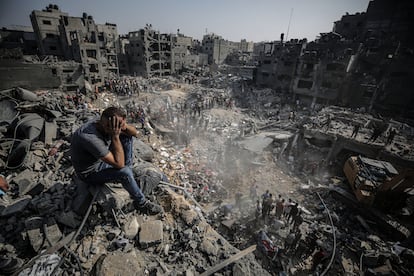The double martyrdom of Jabaliya
The largest refugee camp in northern Gaza was hit by two Israeli strikes in 24 hours, causing dozens of deaths. The U.N. and EU have condemned attacks against the civilian population


To reach Gaza City from the Erez crossing — the only pedestrian land crossing with Israel, which has been closed for more than three weeks — it was customary in peacetime to drive through Jabaliya, a former refugee camp erected in 1948. Over the years, it grew into a 0.6 square mile slum that was home to around 115,000 people at the beginning of the war. When crossing Jabaliya, on the northern outskirts of Gaza’s capital, the characteristic Middle Eastern haphazard street pattern contrasted with the modern city and its straight avenues. Now it has suffered a double martyrdom. In just 24 hours, between Tuesday and Wednesday, Israeli bombardments struck Jabaliya twice in succession, a continuation of open war in which the Israel Defense Forces (IDF) have launched 11,000 air strikes over the last 25 days against a coastal enclave where nearly 9,000 Palestinians have lost their lives.
The large crater opened up in the Fallujah district of the refugee camp by the impact of an Israeli missile corresponds to one of the deadliest tolls of the current conflict in a densely populated residential area. At least 50 people were killed and another 150 injured, according to a Gaza Health Ministry report, although other sources put the death toll at 150 and Hamas spokesmen say over 400 people were killed. Dozens of corpses lay sprawled on the floor of Gaza’s Indonesian Hospital, according to images obtained by Reuters.
The breakdown of telephone and internet communications, following the damage sustained Wednesday by the Paltel company’s power station, has not helped shed light amid conflicting information. The Israeli army insists that the target of the attack on Jabaliya was “more than 50 Hamas terrorists barricaded in a multi-story building, located near a school, a medical center and government offices.”
All the militiamen were killed, according to the same military source, when the tunnels and subterranean bunkers in which they were located collapsed. Military spokesmen say they were commanded by the leader of Hamas’s Jabaliya battalion, Ibrahim Biaari, considered one of the masterminds of the October 7 attacks in which 1,400 Israelis were killed and 230 others kidnapped.
Hamas spokesman Hazem Qasem later replied that no militia commanders were at the site of the bombing, and that Israeli troops used this pretext to attack a civilian area. Contrary to its usual stance, the IDF acknowledged in statements by one of its international spokesmen, Lieutenant-Colonel Jonathan Conricus, that civilians were among those killed in the aerial bombardment of Jabaliya. The Israeli authorities did not specify the number of dead, which the IDF said was under investigation.
“We will do whatever it takes to destroy Hamas completely,” warned Defense Minister Yoav Gallant. “Hamas members have two options: Either die in their positions or surrender unconditionally. There is no third option.” For more than two weeks, senior army commanders have been insisting that the civilian population evacuate Gaza City and the north of the Strip and head towards the south of the Palestinian coastal territory. They also stress in their communiqués that Hamas militias are hiding their military installations in residential areas, whose residents they use as human shields.
Tuesday’s bombing was met with silence, in parallel to the communications blackout in Gaza. Al Jazeera reported an Israeli attack with casualties in the Fallujah district of Jabaliya, without specifying details. Palestinian emergency services sources confirmed to Agence France Presse that there had been another bombing of the refugee camp. Israeli forces claimed in a statement issued Wednesday night to have killed another Hamas commander in the second strike. According to the brief, the Israeli Air Force struck a Hamas command compound in Jabaliya, killing the head of the Islamist militia’s anti-tank unit, Mohamed Asar. Hamas limited itself to issuing a statement describing the bombing as “a massacre” that caused “dozens of dead and wounded.” Video images recorded Wednesday in the Fallujah district showed several civilians among the rubble as the wounded were being evacuated.
UN: Israeli bombing of Jabaliya an “atrocity”
United Nations Under-Secretary-General for Humanitarian Affairs Martin Griffiths has described Tuesday’s bombardment of the Jabaliya refugee camp as an “atrocity.” “The fighting in the Gaza Strip has entered a terrifying phase,” he warned. “In Israel, a nation was left in shock after the brutal and graphic killing of some 1,400 people. The families of more than 200 hostages continue to live in anguish, unsure about the fate, wellbeing and whereabouts of their loved ones,” Griffiths said in a statement. “In Gaza, women, children and men are being starved, traumatized and bombed to death. They have lost all faith in humanity and all hope of a future,” he added.
High Representative of the European Union for Foreign Affairs and Security Policy, Josep Borrell, said Wednesday he was “appalled” by the high number of casualties in Tuesday’s bombing. The EU’s chief diplomat recognized that Israel has the right to defend itself, within the framework of international humanitarian law, while “ensuring the protection of civilians,” according to a statement released through the social network X. Israel’s Prime Minister Benjamin Netanyahu has so far rejected international calls for “a humanitarian pause” to allow in aid for the more than two million inhabitants of the Gaza Strip.
Sign up for our weekly newsletter to get more English-language news coverage from EL PAÍS USA Edition
Tu suscripción se está usando en otro dispositivo
¿Quieres añadir otro usuario a tu suscripción?
Si continúas leyendo en este dispositivo, no se podrá leer en el otro.
FlechaTu suscripción se está usando en otro dispositivo y solo puedes acceder a EL PAÍS desde un dispositivo a la vez.
Si quieres compartir tu cuenta, cambia tu suscripción a la modalidad Premium, así podrás añadir otro usuario. Cada uno accederá con su propia cuenta de email, lo que os permitirá personalizar vuestra experiencia en EL PAÍS.
¿Tienes una suscripción de empresa? Accede aquí para contratar más cuentas.
En el caso de no saber quién está usando tu cuenta, te recomendamos cambiar tu contraseña aquí.
Si decides continuar compartiendo tu cuenta, este mensaje se mostrará en tu dispositivo y en el de la otra persona que está usando tu cuenta de forma indefinida, afectando a tu experiencia de lectura. Puedes consultar aquí los términos y condiciones de la suscripción digital.








































